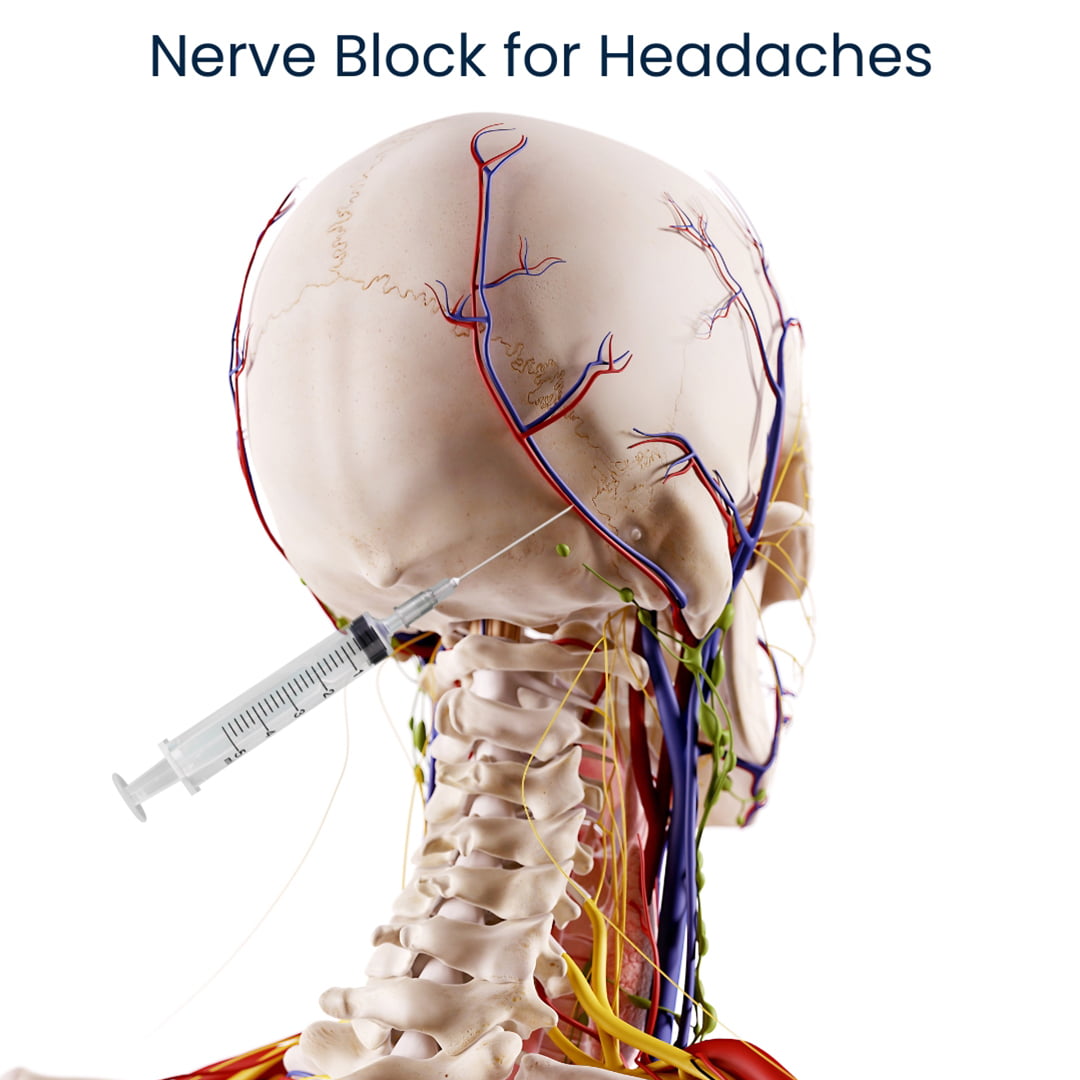Taking prescription pain medication for chronic and acute headaches doesn’t provide a long-term solution. In addition to the risk of addiction, you may face difficulty performing your daily tasks with strong opiates in your system. A nerve block for headaches often proves to be an ideal solution because they work almost immediately and they’re long-lasting. In NYC, find the best nerve block for headache doctors at Pain Management NYC. Call today for a consultation to discover if nerve blocks for headaches provide the solution you need.
What Is a Nerve Block?
 A nerve block for headaches is a medical technique that involves injecting a local anesthetic or other drugs around specific nerves involved in a headache. When other treatments haven’t offered enough relief for some forms of chronic headaches or severe headaches, this type of procedure often proves to be an ideal treatment method. Multiple kinds of nerve block injections are widely used to treat headaches.
A nerve block for headaches is a medical technique that involves injecting a local anesthetic or other drugs around specific nerves involved in a headache. When other treatments haven’t offered enough relief for some forms of chronic headaches or severe headaches, this type of procedure often proves to be an ideal treatment method. Multiple kinds of nerve block injections are widely used to treat headaches.Some of the most common nerve blocks for headaches include:
- Occipital nerve block
- Supraorbital nerve block
- Sphenopalatine ganglion block
- Trigeminal nerve block
In New York City, Pain Management NYC has board-certified doctors who have years of experience in treating several neurological and chronic nerve pain conditions with injections, including for headaches and migraines.
They also treat conditions such as:
- Back pain, Sciatica
- Neck pain
- Facial pain
- Neuropathies
- Carpal tunnel syndrome
- Complex regional pain syndrome
- Arthritis in the knee
What Are the Basics of a Nerve Block?
Headaches can involve a variety of neural pathways and pain signals. Nerve blocks relieve headache pain by blocking pain signal transmission along specific nerves associated with headache discomfort. The method of action varies according to the type of nerve block and the nerves targeted.
The efficacy of nerve blocks for headaches depends on your specific diagnosis, symptoms and how you responded to previous treatments.
Some conditions for which a nerve block is a suitable option include:
- Migraines. Commonly used nerve blocks include occipital nerve blocks, supraorbital and supratrochlear nerve blocks, sphenopalatine ganglion blocks and Botox. For all migraines, but especially chronic migraines, discover what triggers them and avoid those triggers whenever possible.
- Cluster headaches. Consideration is given to occipital nerve blocks, greater occipital nerve blocks and sphenopalatine ganglion blocks when headaches come intermittently.
- Tension-type headaches. It’s possible to use occipital nerve blocks, trigger point injections and cervical epidural steroid injections for tension headaches often caused by stress that manifests in your neck and shoulders before moving to your head.
- Occipital neuralgia. It’s common to have both greater and lesser occipital nerve blockages for which multiple injections may be recommended.
- Chronic daily headaches. Cervical epidural steroid injections and occipital nerve blocks may be considered to block the pain when the source hasn’t yet been identified.
Nerve blocks are safe and effective, especially when you visit experts at delivering the pain reliever at Pain Management NYC. Doctors there provide this service daily and have decades of experience, thus reducing the potential for adverse reactions such as numbness and bruising at the injection site and lightheadedness, which relieve themselves shortly after the procedure.
What’s the Procedure for a Nerve block?
Following an examination that includes your medical history, a detailed account of your symptoms and the specific goals you hope to achieve, your doctor proceeds with the nerve block for headache procedure.
The exact step-by-step technique varies slightly based on the type of nerve block and where it’s being targeted, but the general procedure follows basic steps that include:
- Initial evaluation. Imaging studies, such as x-rays or ultrasound pinpoint the nerve or nerves that will be blocked.
- Preparation. You’re positioned on a table to expose the targeted area and the skin is washed and sterilized.
- Anesthesia. To reduce discomfort during the nerve block process, the skin and underlying tissues at the injection site may be numbed using a local anesthetic.
- Needle placement. Your doctor guides a thin needle toward the targeted nerve or nerve bundle using imaging guidance, such as fluoroscopy, ultrasonography or CT scans. In some cases, the needle is put close to the nerve, while in others it’s implanted directly within the nerve sheath.
- Medication injection. After inserting the needle, a mixture of local anesthetic and, in some situations, other drugs such as corticosteroids or neurolytic agents, are injected. The medicine soaks the nerve at this stage, interfering with the transmission of pain signals.
- Monitoring. You may be observed for a short amount of time to verify that there are no acute issues or bad reactions.
- Recovery. You’re monitored in a recovery area to watch for any immediate side effects or complications.
Post-procedure care is important to ensure a smooth recovery and to reduce the risk of complications. The specific directions vary depending on the type of nerve block and the medication utilized.
However, general care instructions include:
- Rest and observation
- Activity restrictions
- Pain management
- Ice application
- Hydration
- Driving restrictions
- Follow-up appointments
How Long Do Nerve Blocks for Headaches Last?
Following your procedure in the NYC office of your neurologist, you’ll feel almost immediate relief from headache pain — usually within about 15 minutes. Depending on several factors, like how you respond to the medication and the source of your headaches, pain relief can last anywhere from a few days to eight weeks and even for three or four months for some people.
Long-lasting effectiveness of nerve blocks varies widely among patients. And while many are relieved that they can get some time free of pain, others find that they only receive partial pain relief.
Overall, effectiveness of nerve blocks for headaches has proven to:
- Reduce the frequency of migraines and other types of headaches
- Have few, rare side effects
- Be widely accepted as the treatment of choice among headache specialists
- Effectively treat both primary and secondary headaches
- Provide an ideal solution for emergency onset of acute headache pain
What Are Some Advantages of a Nerve Block?
When other treatments have failed to provide enough relief for some types of persistent or severe headaches, this treatment may be ideal for you.
Some advantages of choosing nerve blocks for headache include:
- By administering medications directly to the affected location, the chance of systemic medication adverse effects is reduced.
- By temporarily inhibiting nerves, it’s possible to identify the source of pain.
- By efficiently controlling pain in targeted areas, it improves daily function and mobility.
- When compared to oral medications, it provides longer-lasting pain relief, especially for chronic conditions.
- Physical treatment is supplemented by lowering pain and facilitating participation in rehabilitative activities.
- A nerve block for headaches contributes to opioid-sparing methods by reducing dependency on opioids for pain treatment.
Choose the most competent doctor for proper management and treatment. The effectiveness of a nerve block depends on it. Contact Pain Management NYC to ensure the safest administration of a nerve block procedure.

Boleslav Kosharskyy, MD, is a top-rated, best-in-class interventional pain management doctor. He is board-certified in Anesthesiology, Interventional Pain Medicine, and Palliative Care.
Dr. Kosharskyy is an Associate Professor of Anesthesiology and Rehabilitation Medicine at Albert Einstein Medical College. He’s also the Associate Medical Director of Pain Medicine and Director of Anesthesia for the Joint Replacement Center at Montefiore Medical Center and Albert Einstein Medical College.
He is an active member of the American Society of Anesthesiology (ASA), the American Society of Regional Anesthesia and Pain Medicine (ASRA), and the New York State Society of Anesthesiologists (NYSSA)
